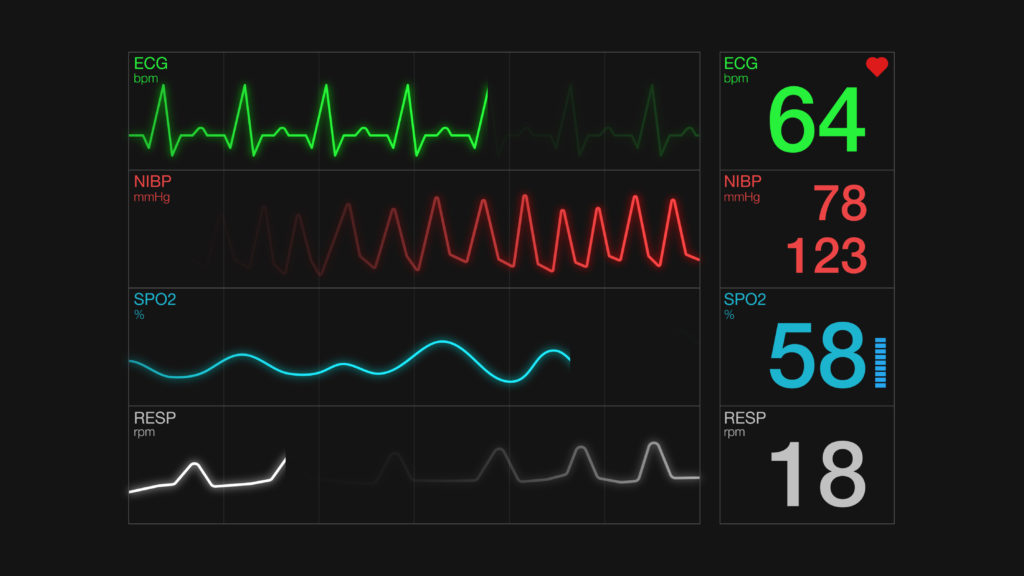The Trending With Impact series highlights Aging publications (listed as “Aging (Albany NY)” by Medline/PubMed and “Aging-US” by Web of Science) that attract higher visibility among readers around the world online, in the news, and on social media—beyond normal readership levels. Look for future science news about the latest trending publications here, and at Aging-US.com.
—
A normal resting heart rate (HR) for adults should be anywhere between 60 and 100 beats per minute. A low resting heart rate has been associated with better overall health and fitness. Crosswise, a higher resting heart rate appears to have a strong correlation with mortality. Heart rate variability (HRV), the beat-to-beat changes in heart rate, is indicative of the heart’s ability to respond to changes in physical and emotional stress. Low HRV has been shown to be a risk factor for heart disease, while high HRV has been associated with good heart health. Although HR and HRV are frequently studied, these parameters are not often investigated continuously or over long periods of time in healthy, middle-aged individuals.
“Parameters of HR and HRV are often investigated during a short electrocardiogram (ECG) measurement at the study center or in the hospital, but not continuously over a longer period while individuals continue with their daily lives.”
The Study
In a new study, researchers Janneke M. Wiersema, Annelies E.P. Kamphuis, Jos H.T. Rohling, Laura Kervezee, Abimbola A. Akintola, Steffy W. Jansen, P. Eline Slagboom, Diana van Heemst, and Evie van der Spoel from Leiden University Medical Center and Catharina Hospital used continuous ambulatory ECG measurements collected over a period of 24 to 90 hours to investigate the relationship between heart rate parameters and familial longevity and chronological age. On August 16, 2022, their research paper was published in Aging’s Volume 14, Issue 18, and entitled, “The association between continuous ambulatory heart rate, heart rate variability, and 24-h rhythms of heart rate with familial longevity and aging.”
“This is one of the first studies to look at the relationship between parameters of HR, HRV, and 24-h rhythms in HR based on continuous ambulatory ECG measurements over a period of several days with both familial longevity and chronological age in a single design.”
The majority of the recruited study participants were middle-aged and from the Leiden Longevity Study (LLS): 37 offspring of long-lived families between 52 and 83 years old, and 36 of their partners/spouses of the same age range. In addition, the researchers recruited 35 younger individuals from the Switchbox Leiden Study between 18 and 40 years old. All study participants were asked to wear a small heart rate monitor, the Equivital EQ02 life monitor (EQ02), for 24 to 90 hours. They were then instructed to carry on with their daily lives and regular routines.
Results & Conclusion
After data cleaning and statistical analyses, no association between heart rate parameters and familial longevity was found. However, middle-aged participants had lower 24-hour heart rates (average and maximum HR, not minimum HR), lower amplitudes, and earlier trough and peak times than the young participants. During long-term EQ02 recordings, middle-aged participants showed a less optimal HRV in both the sleep and awake periods. The researchers believe this might indicate that older hearts are less adaptable than those in the young.
“This could be a first indication of deteriorated cardiovascular health in middle-aged individuals.”
The researchers were forthcoming about the limitations of this study. The study sample was relatively small, there was no standardization of daily activities among the participants, and any potential medications used by the younger participants were not adjusted for (as they were for the middle-aged participants). Despite these limitations, this study provides novel insight into heart rate parameters over longer periods of time and in relation to familial longevity and chronological age.
“In our study, we can conclude that resting HR during the sleep period is not associated with familial longevity or chronological age. This study showed that continuous ambulatory ECG measurements can be used to obtain adequate information on HR, HRV and 24-h rhythms in HR, which was also showed by others [50]. However, the small sample size, due to the poor quality of a part of the data, is a limitation of this study and should be improved in future studies. Furthermore, we suggest for future research to control for exercise and day planning between groups. Lastly we suggest to include an additional group with participants of an older age than the middle-aged group, and to investigate the relation between health status and HR parameters.”
Click here to read the full research paper published by Aging.
AGING (AGING-US) VIDEOS: YouTube | LabTube | Aging-US.com
—
Aging is an open-access journal that publishes research papers bi-monthly in all fields of aging research. These papers are available at no cost to readers on Aging-us.com. Open-access journals have the power to benefit humanity from the inside out by rapidly disseminating information that may be freely shared with researchers, colleagues, family, and friends around the world.
For media inquiries, please contact [email protected].

